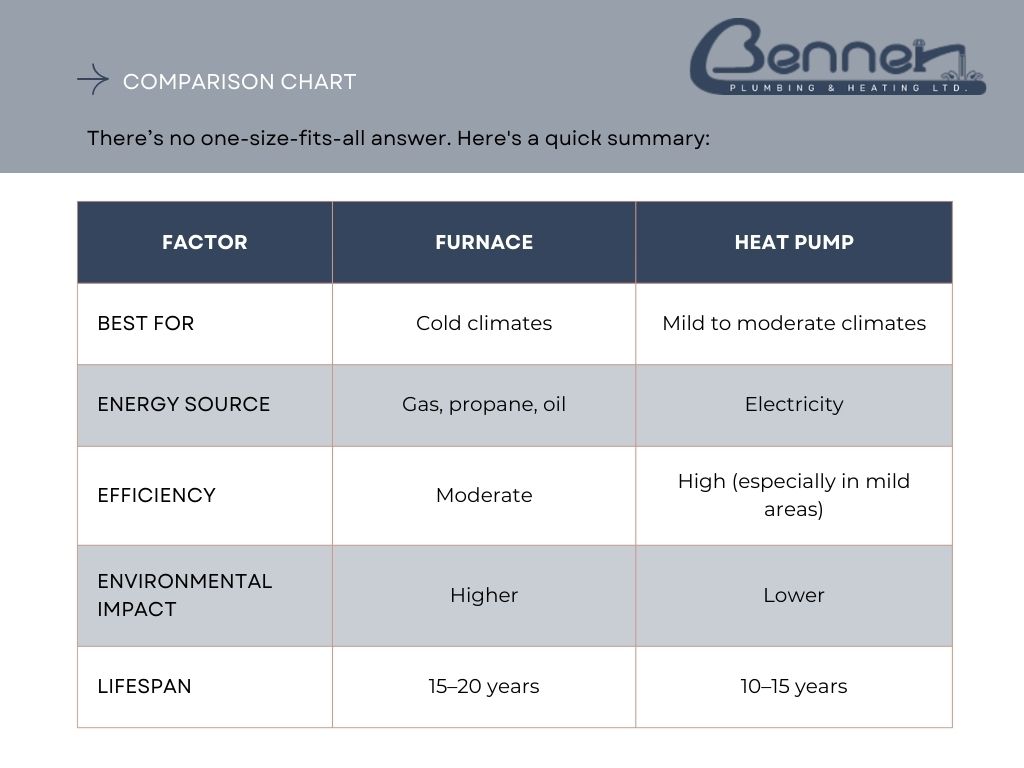Furnace vs. Heat Pump: Which Is Better for Your Home?
When it comes to heating your home, choosing between a furnace versus heat pump can be a tough decision. Both systems have their pros and cons, and the right choice depends on your home’s location, energy efficiency goals, and budget. In this article, we’ll compare furnaces and heat pumps in terms of cost, performance, energy efficiency, and climate suitability to help you decide which heating system is better for your home.
What Is a Furnace?
A furnace is a traditional heating system that burns fuel, usually natural gas, propane, or oil to produce heat. The heat is then distributed through ducts to warm your home. Furnaces are common in colder climates and are known for their powerful and consistent heating.
Pros of Furnaces:
- Effective in Cold Climates: Furnaces work well even when outdoor temperatures drop below freezing.
- Fast Heating: They can heat your home quickly and maintain a steady temperature.
- Long Lifespan: With proper maintenance, a gas furnace can last 15–20 years or more.
Cons of Furnaces:
- Higher Fuel Costs: Depending on your region, gas or oil can be more expensive than electricity.
- Carbon Emissions: Furnaces produce emissions that may contribute to your carbon footprint.
- Installation Cost: Installing a new furnace system, especially with ductwork, can be costly.
What Is a Heat Pump?
A heat pump is an all-electric system that transfers heat instead of generating it. It pulls heat from the outside air (even in winter) and moves it indoors. In summer, it can reverse the process to cool your home. This dual-purpose feature makes it a great year-round solution.
Pros of Heat Pumps:
- Energy Efficient: Heat pumps can be up to 300% efficient, meaning they produce more energy than they consume.
- Environmentally Friendly: Since they run on electricity and don’t burn fossil fuels, they produce fewer emissions.
- Heating and Cooling in One: No need for a separate air conditioner.
Cons of Heat Pumps:
- Less Effective in Extreme Cold: Performance may drop below 30°F (-1°C) without a supplemental heat source.
- Upfront Cost: High-efficiency heat pumps can be expensive to install.
- Lifespan: Heat pumps typically last around 10–15 years, slightly shorter than furnaces.
Key Factors to Consider
1. Climate
Your region’s climate plays a big role in this decision.
- Cold climates (below freezing): Furnaces perform better and more efficiently.
- Mild to moderate climates: Heat pumps are ideal due to their efficiency and dual functionality.
2. Energy Costs
Consider the price of electricity vs. gas in your area. If electricity is cheaper or you’re using solar panels, a heat pump might be more cost-effective in the long run.
3. Environmental Impact
If reducing your carbon footprint is a priority, heat pumps are the greener option, especially when powered by renewable energy.
4. Installation & Maintenance
- Furnaces often require more complex ductwork and venting.
- Heat pumps need less space and can sometimes be installed as ductless systems (mini-splits).
So, Which Is Better for Your Home?

Final Thoughts
Choosing between a furnace versus heat pump depends on your home’s location, energy goals, and budget. For cold climates and homes with existing gas infrastructure, a furnace may be the better choice. For milder areas and eco-conscious homeowners, a heat pump offers energy savings and a lower environmental impact.
If you’re still unsure which system is right for you, reach out to Benner Plumbing & Heating. Our experts can assess your home and help you make the best long-term choice for comfort, efficiency, and value. Whether it’s a furnace or heat pump, we’re here to guide you every step of the way.